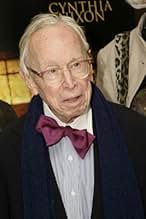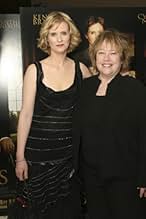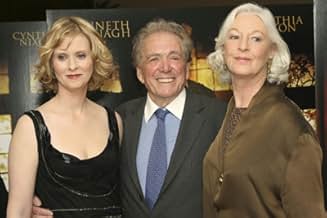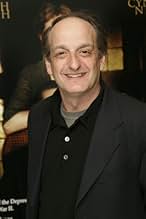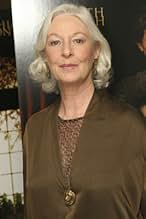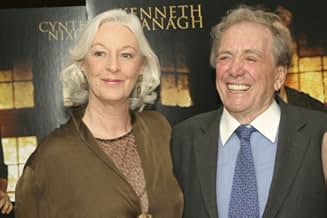Biografía del presidente norteamericano Franklin Delano Roosevelt. Se centra sobre todo en su vida privada y especialmente, en su lucha contra la poliomielitis, enfermedad que lo condenó a v... Leer todoBiografía del presidente norteamericano Franklin Delano Roosevelt. Se centra sobre todo en su vida privada y especialmente, en su lucha contra la poliomielitis, enfermedad que lo condenó a vivir en una silla de ruedas desde los 39 años.Biografía del presidente norteamericano Franklin Delano Roosevelt. Se centra sobre todo en su vida privada y especialmente, en su lucha contra la poliomielitis, enfermedad que lo condenó a vivir en una silla de ruedas desde los 39 años.
- Ganó 5 premios Primetime Emmy
- 12 premios y 42 nominaciones en total
- Fred Botts
- (as Matthew O'Leary)
- Jake Perini
- (as Andrew Davoli)
- Elliott Roosevelt
- (as Brian Durkin)
Reseñas destacadas
This version is less sentimental and perhaps more truthful than "Sunrise at Campobello", Dory Shary's play and film, from 1958 and 1960, covering the same events. Perhaps that is because many of the people involved were still living at the time, and the events and personages were still in living memory for so many in the audience for that piece, in 1960.
This version, however, minces no words and does not turn away from the grim reality of all the challenges Franklin faced, emotional and physical, in dealing with his illness. The performances of all involved are excellent. It is a challenge to portray people so well known to so many, and these actors, all of them, shine in their roles.
Central to all of this of course must be the performance of the actor playing FDR. For many, after "Sunrise at Campobello", only Ralph Bellamy could play Roosevelt, and he did it with great panache, even to repeating his performance twice, twenty and thirty years later, in the miniseries "Winds of War" and "War and Remembrance" in the 80s.
Without a doubt Kenneth Branagh gives what must be one of the best performances on film I have ever seen. He never descends to caricature or impersonation, he does not really look like FDR, he only gives suggestions of Franklin's speech rhythms and accent. But this actor inhabits the character as written so completely, with such wide emotional, physical and vocal range that I for one was totally convinced. This is truly a great film performance, worthy of any awards that it gets. And I hope it is recognized.
The acting and production values are superb, but the film tries to paint over a few things in order to make FDR's evolution look more perfect than it was. The truth is FDR and his wife Eleanor never truly reconciled after his illness as is shown in the film. It did not bring them close together. The only reason they did not divorce was the insistence of Roosevelt's mother, and then as FDR got more involved in politics, appearance was involved in them staying together. FDR and Lucy Mercer, the woman he wanted to divorce Eleanor for, carried on a relationship of sorts from 1915 until Roosevelt died in 1945. Lucy Mercer was with him when he died at Warm Springs. I say this not as a character assassination of a truly great leader long dead, but to point out that a person can be far less than perfect personally and still be that truly great leader. This film's makers seem to think the viewer is not smart enough to deal with that.
There is one bit more of oversimplification that made me roll my eyes. After FDR gets involved in the running of Warm Springs, some patients from the Northeast arrive. One of them, with an obvious New York accent, shakes the hands of one of the black caretakers. The black caretaker looks shocked to be treated as an equal by a white man. The insinuation here is that racial prejudice did not exist in the Northeastern U.S. which is poppycock. Some of the most racially prejudiced people you'll meet are from the Northern U.S. See some episodes of "All in the Family" to see the awful truth.
Now in only two paragraphs I can tell you everything I don't like about this film and I just did that. If not for these two white-washings I'd give it ten stars and I still highly recommend you watch it if you get the chance. Cynthia Nixon really makes you believe she is Eleanor Roosevelt, and Kenneth Branagh is superb as FDR, a man who has to come to terms with his new limitations and yet sees how lucky he was to have at least 39 years of good health and the financial resources to deal with his own health and maybe help some other people too. There's always someone worse off than you are, and maybe you can lend them a helping hand is the inspirational message of this film to me. Highly recommended.
Kenneth Branagh gives a riveting, detailed performance as FDR (leave it to the British to portray our great Americans). One sees a vital man struck down and feels his pain as he struggles to walk again and deal with the ramifications of his illness on his political life.
The film brings to life the prejudice and shunning of the handicapped and the fear people had that they could actually catch polio from another person. It was unheard of for a person of FDR's stature to continue his career once he developed polio. Yet, as we all know, he did, and no one ever called him a cripple.
Cynthia Nixon gives a beautiful portrayal of Eleanor Roosevelt, who, though disillusioned in her marriage, remains a true partner to FDR. Their marriage was much more than one of love or even partnership - her admiration and commitment to this man, and his to her, was very real in spite of their problems.
I highly recommend this very beautifully done film.
Mr. Roosevelt was a man that came from wealth and privilege. The Roosevelts and the Delanos were involved in politics most of their lives. When we first meet F.D.R. and his family, we find then living under the influence of his bossy mother, Sara Delano. His wife Eleanor is no fool, she soon realizes her husband is having affairs with other women. Eleanor's mother-in-law quickly takes command of things as she reminds the younger woman that some great men have mistresses outside the home, but that it shouldn't be a cause for a divorce, something that wouldn't have been Franklin's political death, at the time.
We watch in horror how Mr. Roosevelt is stricken with polio. In spite of his political savvy, Franklin is not ready to accept what has befallen him. With the reluctant aid of Eleanor, he answers an invitation to go to rural Georgia, to Warm Springs, where the owner has written him, some progress has been seen on people with suffering polio.
Warm Springs is more backward than what the Roosevelts expected. Franklin is determined to make a go of it. Helped by Tom Loyless, the man in charge of the springs, Mr. Roosevelt begins to see some progress. At the same time, he and other polio sufferers, are the target of some disdain and bigotry by people that have used Warm Springs for other afflictions. The arrival of a physical therapist, Helena Mahoney, works wonders for Franklin and the patients staying in the spa. Mr. Roosevelt ends up buying the place and turns it into a treatment center for people with polio.
We also watch how Eleanor, guided by the Roosevelt's loyal friend, Louis Howe, gets her involved in the political arena. She champions the cause for women to get into social issues, something she would pursue until the end of her days. Mrs. Roosevelt rises to the occasion when Franklin is taught how to walk and in an emotional finale, we see him appearing before a Democratic convention. Ironically, he would be elected on the next election and win three other terms as president of the country, in spite of his physical condition, that took a back seat to the reality of running the country.
If anyone seems to have been born to play Franklin Roosevelt, it is Kenneth Branagh. This actor bears an uncanny resemblance with the younger Roosevelt. Mr. Branagh makes an excellent characterization of the iconic man that still cast a strong shadow with the legacy he left behind. As Eleanor, Cynthia Nixon, is equally Mr. Branagh's match. With a prosthesis to change the look of her teeth, Ms. Nixon is extremely appealing as Mrs. Roosevelt.
The supporting players do amazing performances. Tim Blake Nelson who plays the kind Tom Loyless is a joy to watch, as in everything this actor does. David Paymer is the loyal friend Louis Howe. Kathy Bates is Ms. Mahoney, the therapist that is instrumental in teaching F.D.R. how to walk. Jane Alexander is also good as Sara Delano, a woman with an iron will.
"Warm Springs" takes us into the life of the man who battled infirmity with an amazing courage. Joseph Sargent is to be commended for his direction and the way he got good acting all around from his distinguished cast.
¿Sabías que...?
- CuriosidadesMost of the actors and actresses playing disabled people in this movie are actually disabled, including "I Won't Dance" cast member Teal Sherer.
- PifiasIn the opening scene, newsreel from the Democrat National Convention of 1920 shows FDR talking and people cheering as part of the film. Film with sound wasn't invented until 1927, and even then was quite rare until 1930 or 1931.
- Citas
Franklin Delano Roosevelt: [on first arriving at Warm Springs] This place should be condemned!
Tom Loyless: We have seen better times. But then, I imagine, so have you.
- ConexionesFeatured in Warm Springs: Making of Featurette (2005)
- Banda sonoraI'll See You In My Dreams
Written by Isham Jones and Gus Kahn
Performed by Alice Faye
Courtesy of Twentieth Century Fox Film Corporation
Selecciones populares
Detalles
- Fecha de lanzamiento
- País de origen
- Sitios oficiales
- Idiomas
- Títulos en diferentes países
- Warm Springs
- Localizaciones del rodaje
- Summerville, Georgia, Estados Unidos(train depot)
- Empresas productoras
- Ver más compañías en los créditos en IMDbPro
Taquilla
- Presupuesto
- 13.000.000 US$ (estimación)
- Duración2 horas 1 minuto
- Color
- Relación de aspecto
- 1.78 : 1
Contribuir a esta página



